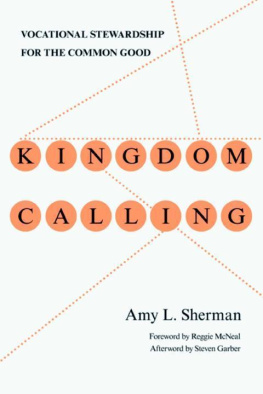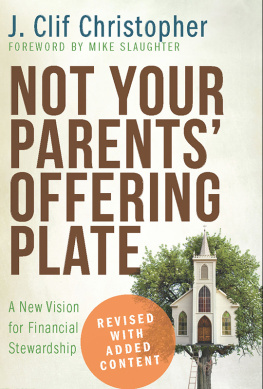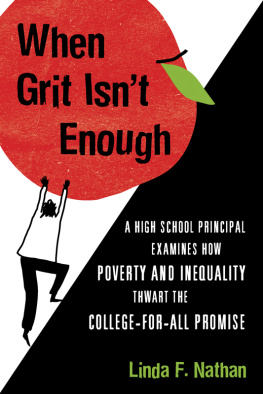Amy L. Sherman
Foreword by Reggie McNeal
Afterword by Steven Garber


a man of vision and humility,
a tsaddiq.
How blessed I am to colabor with you.
......... 11
........... 13
Introduction
....... 15
PART 1: Theological Foundations
.... 27
..... 45
...... 64
........... 77
PART 2: Discipling for Vocational Stewardship
....... 91
The Status Quo Is Inadequate
........... 101
............ 116
........... 129
PART 3: Pathways of Vocational Stewardship
....... 143
Four Pathways
........... 151
Bloom Where You're Planted
........... 169
Donate Your Skills
........... 183
Launch Your Own Social Enterprise
........... 199
Participate in Your Church's Targeted Initiative
............. 223
Rejoicing the City
......... 232
............. 235
Key Theological Themes Undergirding Vocational Stewardship
............. 242
A Discussion Guide for Congregational Small Groups
............. 245
For Further Information
............. 246
Index of Profiles by Vocation
.............. 248
........... 272
Two recent personal conversations tell the story inside the story of this book. The first one took place over dinner in my home with my older daughter. "I don't need the church coming up with anything else for me to do in order to be missional," she said. "I feel missional five days a week." Working as a Licensed Master Social Worker (LMSW) in a local hospital, she is exposed to the dark underbelly of our culture, helping people each day sort through a series of health-care options that will shape the next chapter of their lives. Lots of times none of the options are good, and people are devastated. Often she is the only person who can speak a word of hope in the situation. She is living out her faith in a place and in a way that really counts. Right where life (and death) is happening.
The second conversation took place half a continent away from me. A pastor relayed to one of our Leadership Network researchers a comment made by one of his team members after they had participated in our Missional Renaissance Leadership Community. The multiple teams involved in this leadership community include both church leaders and community leaders who figure out ways to fast-forward the church's missional engagement in their respective communities. This particular team had brought their city's mayor to a recent gathering in Dallas. On the flight back home from the experience the mayor commented to the pastor, "I have never thought of my job as mayor as a ministry-until now." I suspect no church committee assignment could compare in terms of community impact with what this guy does every single day.
My daughter and the mayor represent a growing number of people who share an awareness that kingdom assignments typically involve venues beyond local church real estate and programming. Kingdom callings take us into schools, hospitals, businesses and art studios, as well as homeless shelters, AIDs clinics and battered-women's homes. Kingdom callings are lived out as neighbors, friends, spouses, parents, employees and students, as well as community volunteers, school mentors, Little League coaches and, yes, church workers. In other words, kingdom callings play out in all of life, because that's where life plays out!
For centuries we have focused on church-centric activities as the primary arena for exercising our calling as followers of Jesus. The missional perspective of the church does not shrinkwrap the kingdom down to this limited scope of activity. Missional thinkers see the church in its fullblown kingdom capacity-deployed across all domains of our culture. We are the "called out" people of God for sure. But we have been "called out" to be "sent back"! We are sent back as viral agents of the King to partner in his redemptive mission in the world.
In this thoughtful volume Amy Sherman shares with us her conviction that "vocational stewardship"-the intentional deployment of our workplace knowledge, skills, platforms and networks-provides us a way to advance the kingdom for community transformation. Amy's work goes beyond the typical discussion of faith/work integration. Not only does she help us see the potential for promoting a kingdom agenda at work, she gives us suggestions for how congregations and church leaders can equip their members to pull it off. If you are thinking this book primarily will help church people learn how to start Bible studies at work, then your thinking is far too restricted. Amy has nothing less than changing your city in mind!
Imagine architects serving the kingdom as architects and bankers promoting kingdom values as bankers, all directing their efforts into community development to help people experience the abundant life Jesus talked about. Now imagine having a resource so people who "get" this can "get on" with it. Imagine no longer.
Just turn the page.
Reggie McNeal
Missional Leadership Specialist, Leadership Network, Dallas, Texas Author of Missional Renaissance and Missional Communities
Many individuals participated in this project, and I owe them a debt of gratitude that I cannot convey in mere words. Nonetheless, these thanks are heartfelt. My intellectual debt to Rev. Tim Keller of Redeemer Presbyterian Church, New York City, will be readily evident in the pages ahead. Tim, your work and words have enriched my life beyond measure. Andy Crouch generously shared his time with me and steered me ably in the early days of the project. Andy, your encouragement has been precious, and your writing has taught me much. Steve Garber's insights and counsel have been invaluable. Steve, how pleased I am to be colaboring with you in this vineyard where you have been faithful over so many years!



















